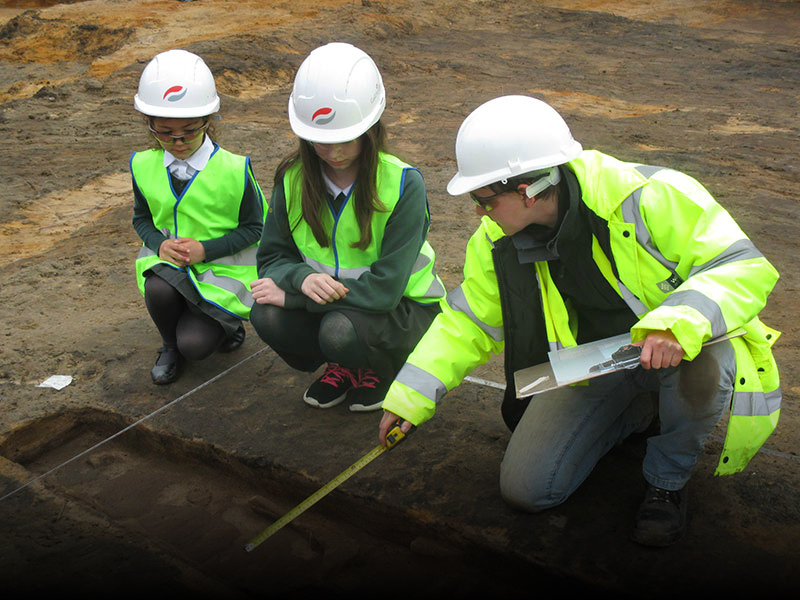
Archaeology and Outdoor Learning
Eila Macqueen, Director of Archaeology Scotland, reflects on the recent parliamentary debate and Archaeology Scotland’s experience of offering outdoor and place-based learning.

At a recent members’ business debate in the Scottish Parliament, the topic of heritage and environmental conservation charities’ support for outdoor learning was raised and discussed with a particular emphasis on the natural environment, but of course we all know that the natural environment has been shaped by people both past and present. Archaeology Scotland has over twenty years’ experience offering archaeology and place-based learning and our Heritage Hero project (which ran from 2012 to 2015 with funding from Heritage Lottery Fund, Paul Hamlyn Foundation and the LEADER programme) established a successful framework for delivering outdoor archaeological learning. With over 900 pupils from South Lanarkshire and Scottish Borders participating in the project, it aimed to support the transition process from Primary 7 to Secondary 1 and instil an interest in using archaeological approaches to exploring and recording local sites including historic graveyards and a former WWI Prisoner of War Camp.
Richard Lochhead MSP said during the Parliamentary debate that “Outdoor education is the future of education in Scotland. We have to give it a central role in increasing attainment and promoting health and wellbeing—mental and physical—as other members have said” and he cited recent research by Dr Beth Christie from the Outdoor & Environmental Education Section of Moray House School of Education about the “need to develop an empathy and ethic of care towards the environment”[1].
Scotland’s rich cultural heritage offers boundless opportunities for outdoor learning. Providing young people with opportunities to engage directly our historic environment helps with the development of critical thinking skills through exploring evidence of past cultures and making links to how we live today. These place-based learning experiences allow learners to look at familiar spaces and places in new ways, encouraging young minds to explore landscapes and empathise with people in the past. Archaeology has the additional benefit of promoting cross-curricular learning – the mix of skills required in the investigation of archaeological remains helps make links between different subject areas (social sciences, literacy, sciences, mathematics, technologies and expressive arts). This is in addition to the health and wellbeing aspects of working outdoors. It also encourages a sense of stewardship, helping safeguard Scotland’s heritage for future generations and hopefully doing something positive towards developing empathy and ethic of care.
We have created the Heritage Hero Awards which are available to young people throughout Scotland at no cost to them. All young people achieving a Heritage Hero Award have to actively engage with heritage and most groups choose to look at historic sites and buildings in their locality. This has ranged from exploring a local high street to investigating a nearby hillfort. Young people have been involved in activities including excavating their local graveyard in Dunfermline; mapping the industrial heritage of their local canals in Inverness, Falkirk, Edinburgh and Glasgow; researching the changing functions of buildings in their local area through photography in Inverclyde; and planning and delivering activities at a castle carnival in Ardrossan. The Awards have been used by heritage organisations, primary and secondary schools, community groups and youth groups. Some groups are now using the Awards alongside other important outdoor learning focused awards, including the John Muir Awards and Duke of Edinburgh Awards. Projects have been completed in 12 of Scotland’s local authorities with 965 people currently recipients of a Heritage Hero Award and applications continuing to come in from across the country.
As part of Scotland’s Archaeology Strategy, we are planning on working with the Outdoor Woodland Learning network to encourage greater use of archaeology and heritage by educators and developing programmes of work to support young people learning through visiting sites in the care of NTS, HES and others such as the Historic Houses Association. We have also been talking to Learning Away about their “Brilliant Residentials” campaign and would support a call for schools to allocate pupil equity funds to residential experiences and visits to historical sites and building in Scotland. This attainment funding is allocated to head teachers and they can decide how to spend it.
As Beth Christie’s research says, “ultimately behaviour change stems from a connection to a place; in other words young people will make the effort to love and care for something that they are positively connected to.”
Eila Macqueen, Director of Archaeology Scotland
May 2017
[1] Christie, B. (2012). The impact of outdoor learning experiences on attitudes to sustainability: a brief review of literature. Field Studies Council/University of Edinburgh. Field Studies Council Report 06/2012.
BACK


